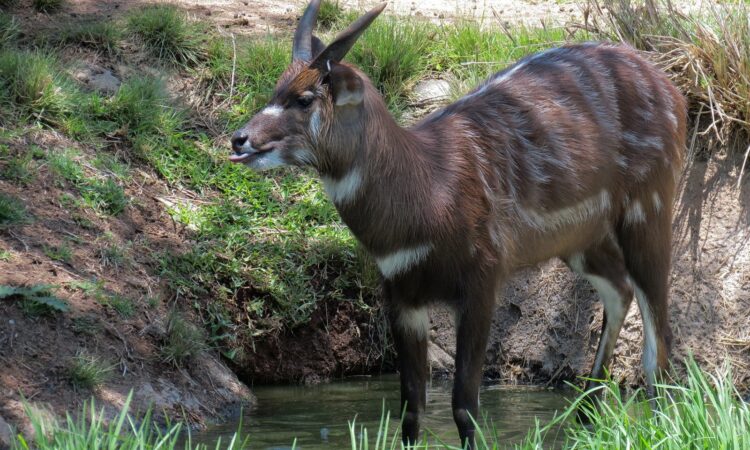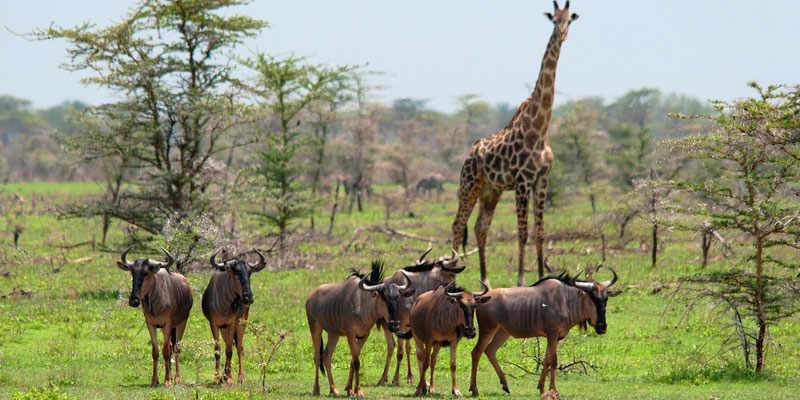When is the best time to Visit Kigosi National Park: Kigosi National Park is one of the largest and excellent parks in East Africa It has a floodplain and a wetland ecosystem, and the park provides an important wild animal protection and feeding area during the dry season for migratory animals that includes the water birds and large mammals. The national park is located in the Shinyanga Region, Geita Region, and northwest Tabora region of Tanzania. Kigosi National Park was established in 2019, coring an area of approximately 8,265 square kilometers. the park encompasses the Moyowosi/Malagarasi wetlands complex, which is the largest wetlands complex in East Africa, The Malagarasi, Moyowosi, Nikonga, Ugalla, Kigosi, Nikonga, and Gombe are seven slow-moving rivers that meander through a vast and intricate network of marshes, plains lakes, and woodlands.

The climate of the area Reserve experiences two rainfall peaks per year in February and November. The dry season starts in mid-May and ends in mid-October. Annual rainfall varies between 1,000m and 1,500m. It is one of the largest reserves in East Africa with floodplains and wetland ecosystems. This reserve is an important wild animal protection and feeding area during the dry season for migratory animals like waterfowl and large mammal species. The maximum temperature of the area is 29°C.
Meaning, that the best time to visit Kigosi National Park is the dry season which runs from mid-May and ends in mid-October. During this time, the weather is mild and the skies are clear, making it perfect for wildlife viewing and outdoor activities. The dry season also makes the peak of the park’s wildlife migration, so visitors have a higher chance of spotting animals such as lions, elephants, and giraffes among others.
However, if you prefer to avoid the crowds and experience the park in a more peaceful setting, the shoulder seasons of January to March and then November to December are also good times to visit. During these months, the park is less crowded and you may have the chance to see newborn animals or witness the lush green landscapes that come with the rainy season
When is the best time to Visit Kigosi National Park: It’s important to note that the wet season in Kigosi National Park is typically around from March to May and while the park is still open to visitors during this time, the heavy rains can make roads muddy and impassable. it may also be more difficult to spot wildlife as animals tend to seek shelter during heavy rainfall.
Amazing thing to do at Kigosi National Park
Wildlife safaris
One of the primary attractions of Kigosi National Park is its rich wildlife. The park is home to a variety of animals, including Zebras, sitatunga, Baboons, Eland, Lions, buffalo, sable, roan, kudu, leopard, waterbuck, hippos, Defassa waterbuck, Lichtenstein’s hartebeest, oribi, common and Bohor reedbuck, hyena, crocodiles and topi. Visitors can embark on a guided game drive, which offers a chance to witness these majestic creatures in their natural habitat. With experience guides at the helm, you’ll learn about the behaviors and habitats of the resident wildlife, making it a truly immersive experience.

Bird watching
For bird lovers, Kigozi National Park is a paradise. The park boasts hundreds of bird species, including the endangered shoebill stork, pelicans, wattled cranes, and kingfishers among others. Visitors can participate in birdwatching tours led by knowledgeable guides who can help identify various birds and share insights into their behavior
Hiking and nature walks
Kigozi National Park features a network of hiking trails that cater to various levels of experiences. Exploring the lush landscapes on foot allows you to connect with nature in a more intimate way. Trails wind through dense forest, alongside rivers, and up to panoramic viewpoints offering breathtaking views of the park and beyond. guided nature walks are also available, providing an opportunity to learn about the flora and fauna while enjoying the serene atmosphere.
Sport Fishing
Visitors at Kigosi National Park will have an opportunity to do sport fishing in the World Second Largest freshwater lake- Lake Victoria. Nile perch weighing as much as 100 Kg have been caught during this rare activity. Come and experience this exercise at Kigosi National Park
Cultural experience
Cultural experience is one of the popular activities done in the park, allowing visitors to engage with the local communities to learn about their traditions, arts, and way of life. Cultural village tours offer demonstrations of traditional crafts, music, and dance, providing visitors with a deeper understanding of the region’s heritage.
Photography
With its stunning landscape, diverse wildlife, and vibrant local culture, Kigosi National Park offers endless opportunities for photography. During your photography safaris, you will have the chance to capture the stunning beauty of the sun setting over the African savannah and the intricate details of flora and fauna among others.
Boat safaris
Lake Kigosi is situated in the heart of Kigosi National Park, is a natural marvel that offers visitors a unique wildlife experience, one of the best ways to explore the hidden treasures of the lake and the park’s diverse ecosystem is by taking a boat cruise, which allows you to get up close and personal with the diverse wildlife that call this area their natural habitat. During your boat cruise safari on Lake Kigosi, you will have an opportunity to encounter with a variety of wildlife including hippos basking in the sun, crocodiles lounging on the banks, and elephants drinking and playing in the water. You will also have a chance to spot different bird species such as African fish eagles, kingfishers, herons, yellow-billed stork, pelicans, African jacana, grey-capped warblers, grey-crowned cranes, cormorants, shoebill among others which are seen along the shores., making boat safaris an excellent choice for nature enthusiasts.
Camping and stargazing
For those looking to immerse themselves in nature, camping within Kigosi National Park is a thrilling option. The park has several designated camping areas which offer facilities for both tents and self-contained campers. The clear night skies offer spectacular views of the stars, and during your lucky days, you might even catch a glimpse of the Milky Way. Camping is a fantastic way to experience the tranquility of the African wilderness after the sun sets.


